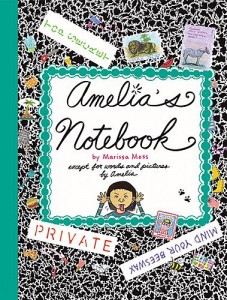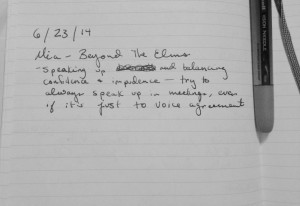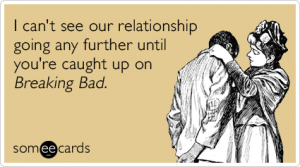I’m way too unreliable to keep a journal.
The last time I consistently kept a journal (of sorts) was when I blogged while studying abroad—and then I had the fact that my family was worried for my well-being to motivate me. I’m just not one to record my day-to-day life. Time always seems to slip away from me.
But when it comes to knowing my stuff—both what’s relevant to my professional goals and to my personal interests—I am very consistent. Keeping a record of things that are important and storing the records in an easily accessible place has become an indispensable part of my professional and personal growth. My little black notebook has saved the day many times.
Anyone who knows me well knows I carry my little black notebook around with me pretty much everywhere. I keep a record of anything I read or hear that I find to be important or particularly poignant in that notebook. I never thought something so simple would make my life so much easier and more organized, but now I’ll never look back.
The great thing about this method of thought organization and documentation is that it can be modified to fit pretty much anyone’s preferences or needs. Here are my basic tips for keeping your own idea journal.
Gather your supplies. Before I went to a really important conference last spring, I bought a hardcover, well-bound, black notebook. At the time, I mostly wanted something that would look sleek and professional, but I’ve since realized that anything else wouldn’t have worked. If you want to keep track of things in a notebook, you’ll want to find one that’s durable. My poor little book gets thrown into every bag, dropped on the ground, shoved off my bed—I’m notorious for spilling food on things, so I’m just awaiting the day when that happens. Get something that’s going to last. You won’t regret it.
While you’re at it, go get some pens and toss one in every bag you carry, and in the pocket of your jacket/coat/blazer/etc. Learning something good and not being able to write it down is the worst.
Keep good records. Before I start writing down something I learned, I like to make some notes about the context. Check out these notes I made on a post from Beyond the Elms blogger Mia last month! This is a good example of the average entry in my notebook.
Start writing. At first, I thought I would just pull out my notebook when something interesting happened. I would wait for the occasion to arise and then whip it out to start writing. Now, I see it as a way to challenge myself to find innovation in places I wouldn’t always expect. Here are some things to get you going:
1. Facts & Figures. The easiest place to start is to write down important hard information and statistics you encounter. When you read studies or listen to lectures, jot down the argument made and try to learn as much of it as you can. This way you can whip out those percentages and other figures when you need them.
2. Not Just “What?” but “How?” To dig a little deeper, try to take a step back from the message and look at the messenger. How are they presenting their information? What makes them convincing or not? Does the layout of the fact sheet they give you work? Are their visuals useful? Is the meeting or conference space conducive to the work they’re trying to do? Write down what they do that works—or doesn’t. You’ll be grateful you did.
3. Day-to-Day Bits of Wisdom. What can I learn from a discussion my coworkers have about how the seating at an important event should be organized? What wisdom can I glean from my coworker who always brings treats and snacks to the office? How does the way my manager talks on the phone help her accomplish her goals? It’s easy to jot down straight information, but you can also push yourself to get more out of a situation by looking for off-the-cuff wisdom and innovation.
4. Good Advice. Whenever you get the chance to sit down and get advice from a superior—your boss, manager, mentor, even someone who has been at the company longer than you have—take out your notebook and write down good advice they give. This way you can always look back on your notes later to make sure you remember their suggestions correctly, but more importantly, taking notes shows your advisor that you’re really listening and take their advice seriously. Win-win!
5. Must-Reads. Always having your notebook handy is great when people are constantly recommending books for you to read. I probably have 10 or 15 in my notebook, and they will be wiring patiently until I find the time to sit down and read them.
6. Powerful Words. I was at a town hall a few weeks ago where I got to hear my lawmaker speak candidly with folks who had concerns. I had my notebook at the ready whenever I was sitting down, and I was really excited about getting to write down soundbites and wise words from my boss and from folks who spoke up. Keeping a record of important themes will help you better remember details of what happened on the day.
Analyze. As you can see, keeping a record of things to remember not only helps you remember what happened, but also what’s important about what happened. Numbers 2 and 6 in particular suggest that writing down wise words will also help you recognize who’s really running the show in a given space. If someone’s words keep falling flat, try to figure out why—are they badly or under-informed? Do they lack the passion that others possess? Are they being spoken over or ignored? Are they disorganized? Try to get a sense of the dynamics of the room and figure out what’s happening that isn’t being said.
Keeping a record of important things in your office is also really useful for better understanding how the workplace functions. Everyone has official roles which they play based on their job descriptions, but everyone also serves a role the dynamics of the office. Taking notes of useful things people in the office say will help you understand how people work the way they do and how best to approach a situation where you need something. Either way, writing things down in a handy place helps you dig deeper for a better understanding of what you’re learning as you go through your professional life. Best of all, those of us who can’t keep up with a diary will still be able to look back on ourselves and our growth as long as the notebook decides to stick around.
Do you keep a journal like mine? What do you suggest keeping record of? Let me know what you think!

















